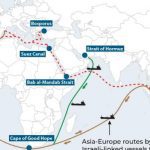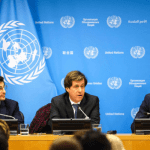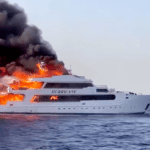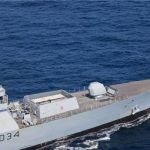The United States has designated Ansarallah, often known as the Houthis, as a specially designated global terrorist, citing continued threats and attacks by the rebel organisation.
This decision comes in response to recent Houthi attacks on ships transiting the Red Sea, which prompted the US to execute targeted strikes on Houthi sites in Yemen.
The designation is crucial because it would prevent terrorists from funding the Houthis, tighten limits on their access to financial systems, and hold them responsible for their acts, according to White House National Security Adviser Jake Sullivan.
This designation will go into effect in 30 days, allowing for humanitarian carve-outs to be implemented to reduce the negative impact on the Yemeni people.
The US government has confirmed that commercial shipments into Yemeni ports, which are critical for delivering food, medicine, and gasoline, will continue and be free from sanctions.
The Houthi rebels, who are affiliated with Iran, claim that the strikes are in response to Israel’s battle with Gaza.
During periods of high tension, the group has undertaken drone and missile assaults against Israel. While most projectiles were intercepted, the attacks have heightened tensions in the neighborhood.
The recent escalation of the Red Sea issue highlights the complex geopolitical processes at work in the Middle East, with potentially far-reaching consequences for regional stability and international marine security.
The United States has designated Ansarallah, often known as the Houthis, as a specially designated global terrorist, citing continued threats and attacks by the rebel organisation.
This decision comes in response to recent Houthi attacks on ships transiting the Red Sea, which prompted the US to execute targeted strikes on Houthi sites in Yemen.
The designation is crucial because it would prevent terrorists from funding the Houthis, tighten limits on their access to financial systems, and hold them responsible for their acts, according to White House National Security Adviser Jake Sullivan.
This designation will go into effect in 30 days, allowing for humanitarian carve-outs to be implemented to reduce the negative impact on the Yemeni people.
The US government has confirmed that commercial shipments into Yemeni ports, which are critical for delivering food, medicine, and gasoline, will continue and be free from sanctions.
The Houthi rebels, who are affiliated with Iran, claim that the strikes are in response to Israel’s battle with Gaza.
During periods of high tension, the group has undertaken drone and missile assaults against Israel. While most projectiles were intercepted, the attacks have heightened tensions in the neighborhood.
The recent escalation of the Red Sea issue highlights the complex geopolitical processes at work in the Middle East, with potentially far-reaching consequences for regional stability and international marine security.
The United States has designated Ansarallah, often known as the Houthis, as a specially designated global terrorist, citing continued threats and attacks by the rebel organisation.
This decision comes in response to recent Houthi attacks on ships transiting the Red Sea, which prompted the US to execute targeted strikes on Houthi sites in Yemen.
The designation is crucial because it would prevent terrorists from funding the Houthis, tighten limits on their access to financial systems, and hold them responsible for their acts, according to White House National Security Adviser Jake Sullivan.
This designation will go into effect in 30 days, allowing for humanitarian carve-outs to be implemented to reduce the negative impact on the Yemeni people.
The US government has confirmed that commercial shipments into Yemeni ports, which are critical for delivering food, medicine, and gasoline, will continue and be free from sanctions.
The Houthi rebels, who are affiliated with Iran, claim that the strikes are in response to Israel’s battle with Gaza.
During periods of high tension, the group has undertaken drone and missile assaults against Israel. While most projectiles were intercepted, the attacks have heightened tensions in the neighborhood.
The recent escalation of the Red Sea issue highlights the complex geopolitical processes at work in the Middle East, with potentially far-reaching consequences for regional stability and international marine security.
The United States has designated Ansarallah, often known as the Houthis, as a specially designated global terrorist, citing continued threats and attacks by the rebel organisation.
This decision comes in response to recent Houthi attacks on ships transiting the Red Sea, which prompted the US to execute targeted strikes on Houthi sites in Yemen.
The designation is crucial because it would prevent terrorists from funding the Houthis, tighten limits on their access to financial systems, and hold them responsible for their acts, according to White House National Security Adviser Jake Sullivan.
This designation will go into effect in 30 days, allowing for humanitarian carve-outs to be implemented to reduce the negative impact on the Yemeni people.
The US government has confirmed that commercial shipments into Yemeni ports, which are critical for delivering food, medicine, and gasoline, will continue and be free from sanctions.
The Houthi rebels, who are affiliated with Iran, claim that the strikes are in response to Israel’s battle with Gaza.
During periods of high tension, the group has undertaken drone and missile assaults against Israel. While most projectiles were intercepted, the attacks have heightened tensions in the neighborhood.
The recent escalation of the Red Sea issue highlights the complex geopolitical processes at work in the Middle East, with potentially far-reaching consequences for regional stability and international marine security.
The United States has designated Ansarallah, often known as the Houthis, as a specially designated global terrorist, citing continued threats and attacks by the rebel organisation.
This decision comes in response to recent Houthi attacks on ships transiting the Red Sea, which prompted the US to execute targeted strikes on Houthi sites in Yemen.
The designation is crucial because it would prevent terrorists from funding the Houthis, tighten limits on their access to financial systems, and hold them responsible for their acts, according to White House National Security Adviser Jake Sullivan.
This designation will go into effect in 30 days, allowing for humanitarian carve-outs to be implemented to reduce the negative impact on the Yemeni people.
The US government has confirmed that commercial shipments into Yemeni ports, which are critical for delivering food, medicine, and gasoline, will continue and be free from sanctions.
The Houthi rebels, who are affiliated with Iran, claim that the strikes are in response to Israel’s battle with Gaza.
During periods of high tension, the group has undertaken drone and missile assaults against Israel. While most projectiles were intercepted, the attacks have heightened tensions in the neighborhood.
The recent escalation of the Red Sea issue highlights the complex geopolitical processes at work in the Middle East, with potentially far-reaching consequences for regional stability and international marine security.
The United States has designated Ansarallah, often known as the Houthis, as a specially designated global terrorist, citing continued threats and attacks by the rebel organisation.
This decision comes in response to recent Houthi attacks on ships transiting the Red Sea, which prompted the US to execute targeted strikes on Houthi sites in Yemen.
The designation is crucial because it would prevent terrorists from funding the Houthis, tighten limits on their access to financial systems, and hold them responsible for their acts, according to White House National Security Adviser Jake Sullivan.
This designation will go into effect in 30 days, allowing for humanitarian carve-outs to be implemented to reduce the negative impact on the Yemeni people.
The US government has confirmed that commercial shipments into Yemeni ports, which are critical for delivering food, medicine, and gasoline, will continue and be free from sanctions.
The Houthi rebels, who are affiliated with Iran, claim that the strikes are in response to Israel’s battle with Gaza.
During periods of high tension, the group has undertaken drone and missile assaults against Israel. While most projectiles were intercepted, the attacks have heightened tensions in the neighborhood.
The recent escalation of the Red Sea issue highlights the complex geopolitical processes at work in the Middle East, with potentially far-reaching consequences for regional stability and international marine security.
The United States has designated Ansarallah, often known as the Houthis, as a specially designated global terrorist, citing continued threats and attacks by the rebel organisation.
This decision comes in response to recent Houthi attacks on ships transiting the Red Sea, which prompted the US to execute targeted strikes on Houthi sites in Yemen.
The designation is crucial because it would prevent terrorists from funding the Houthis, tighten limits on their access to financial systems, and hold them responsible for their acts, according to White House National Security Adviser Jake Sullivan.
This designation will go into effect in 30 days, allowing for humanitarian carve-outs to be implemented to reduce the negative impact on the Yemeni people.
The US government has confirmed that commercial shipments into Yemeni ports, which are critical for delivering food, medicine, and gasoline, will continue and be free from sanctions.
The Houthi rebels, who are affiliated with Iran, claim that the strikes are in response to Israel’s battle with Gaza.
During periods of high tension, the group has undertaken drone and missile assaults against Israel. While most projectiles were intercepted, the attacks have heightened tensions in the neighborhood.
The recent escalation of the Red Sea issue highlights the complex geopolitical processes at work in the Middle East, with potentially far-reaching consequences for regional stability and international marine security.
The United States has designated Ansarallah, often known as the Houthis, as a specially designated global terrorist, citing continued threats and attacks by the rebel organisation.
This decision comes in response to recent Houthi attacks on ships transiting the Red Sea, which prompted the US to execute targeted strikes on Houthi sites in Yemen.
The designation is crucial because it would prevent terrorists from funding the Houthis, tighten limits on their access to financial systems, and hold them responsible for their acts, according to White House National Security Adviser Jake Sullivan.
This designation will go into effect in 30 days, allowing for humanitarian carve-outs to be implemented to reduce the negative impact on the Yemeni people.
The US government has confirmed that commercial shipments into Yemeni ports, which are critical for delivering food, medicine, and gasoline, will continue and be free from sanctions.
The Houthi rebels, who are affiliated with Iran, claim that the strikes are in response to Israel’s battle with Gaza.
During periods of high tension, the group has undertaken drone and missile assaults against Israel. While most projectiles were intercepted, the attacks have heightened tensions in the neighborhood.
The recent escalation of the Red Sea issue highlights the complex geopolitical processes at work in the Middle East, with potentially far-reaching consequences for regional stability and international marine security.














